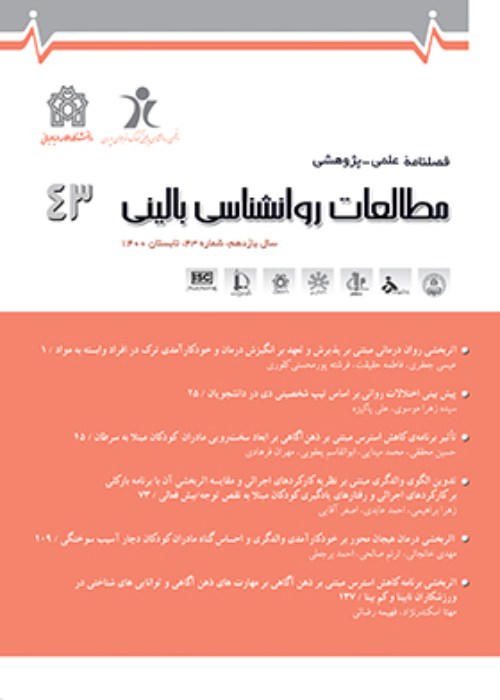The effectiveness of group mindfulness - Based cognitive Therapy on obsessive-compulsive disorder, metacognition beliefs and rumination
Author(s):
Abstract:
obsessive- compulsive disorder is one of the serious complications of psychological health and imposes huge economic and social expenditures annually on society and its disabling symptoms impair the individual's interpersonal function, job and life. The aims of this research were to analyze the effectiveness of group mindfulness based cognitive therapy on obsessive-compulsive disorder, metacognitive beliefs and rumination in female university students. This was an experimental study (pre-test& post-test –follow-up with control group plan). By applying simple random sampling method, out of 338 female students with age range 20-29 by Maudsley Obsessive-Compulsive inventory(MOCI), Metacognitive Beliefs Questionnaire (MCQ-30) & Rumination Responses Scale (RRS) and the eligible individuals diagnostic interview (with Obsessive-Compulsive diagnostic cut-off score) based on DSM-IV-TR,16 subjects have been selected and randomly put in the experiment and control groups (8 for each group). The experiment group received 8 sessions of group mindfulness based cognitive therapy while the control group had no special treatment. Two months after the treatment was over, follow-up was executed subject in both groups before and after the intervention, and two-month follow-up questionnaire, MOCI, MCQ-30, RRS completed. Analyzing data, descriptive statistical methods and covariance analysis test have been employed. The results of covariance test showed a meaningful difference (p<0.005) in the two groups (control &experiment), in terms of Obsessive-compulsive, metacognitive beliefs & rumination scores. Regarding the mentioned findings, it can be concluded that group mindfulness based cognitive therapy is effective in decreasing obsessive- compulsive, metacognitive beliefs & rumination of the girl students with obsessive-compulsive disorder, and the therapeutic changes created almost remained stable after two-month follow-up.
Keywords:
Language:
Persian
Published:
Quarterly of Clinical Psychology Studies, Volume:5 Issue: 20, 2016
Pages:
79 to 109
magiran.com/p1483061
دانلود و مطالعه متن این مقاله با یکی از روشهای زیر امکان پذیر است:
اشتراک شخصی
با عضویت و پرداخت آنلاین حق اشتراک یکساله به مبلغ 1,390,000ريال میتوانید 70 عنوان مطلب دانلود کنید!
اشتراک سازمانی
به کتابخانه دانشگاه یا محل کار خود پیشنهاد کنید تا اشتراک سازمانی این پایگاه را برای دسترسی نامحدود همه کاربران به متن مطالب تهیه نمایند!
توجه!
- حق عضویت دریافتی صرف حمایت از نشریات عضو و نگهداری، تکمیل و توسعه مگیران میشود.
- پرداخت حق اشتراک و دانلود مقالات اجازه بازنشر آن در سایر رسانههای چاپی و دیجیتال را به کاربر نمیدهد.
In order to view content subscription is required
Personal subscription
Subscribe magiran.com for 70 € euros via PayPal and download 70 articles during a year.
Organization subscription
Please contact us to subscribe your university or library for unlimited access!


